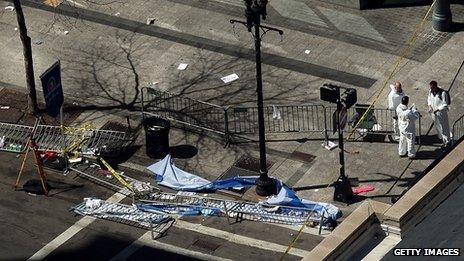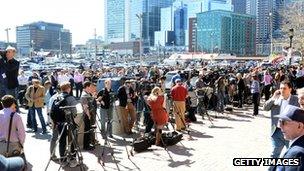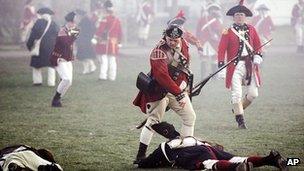Boston's past lessons on the truths people believe
- Published
- comments

BOSTON, MASSACHUSETTS: The debate about who spilt blood in this city and why they might have done it continues - but we should not be surprised, indeed there are still arguments about who fired first at Lexington Green, external in 1775, triggering the American Revolution.
And actually there is a message in what happened here centuries ago about people believing the truths they choose to.
Some link the Boston marathon bomb attack to that earlier event believing the date, Massachusetts State's Patriots' Day holiday, which commemorates what happened at Lexington and the revolution more widely, was a significant part of the attacker's message.
Revolutionary themes - from the citizen's obligation to stand up against tyranny, to the right to bear arms, or the famous dumping of tea in Boston harbour - are central to the ideology of the radical right here, be it the broad-based non-violent activists of the Tea Party movement or the fringe elements who argue that force may be justified to confront their federal government.

Amid reports of a suspect being detained crowds of media thronged outside Moakley Court House
Instant theories about who might have placed Monday's two bombs that killed three and wounded more than 170 have centred on someone who might have been inspired by the ideology of al-Qaeda or the same type of American extremists that placed explosive devices at the 1996 Atlanta Olympics or blew up the federal building in Oklahoma City.
If it was that second brand of terrorism, then the revolutionary symbolism will have been a central part of what happened, but even if the act was motivated by different factors the 18th Century history of this place may still have played its part in determining the target.
Throughout Wednesday there was febrile speculation about the identity of a suspect caught on security cameras depositing a bag at one of the bomb sites. It built even to the point where hundreds of people thronged at a court in the south of the city believing that a man was about to be charged - but that all proved to be an ill-founded rumour.
However, passing the court four hours after the "suspect under arrest" report had been comprehensively denied by everyone from the Boston Police Department to the White House, I noticed that many of the TV satellite trucks from the networks were still there.
Was it "just in case", or was there a desire to keep on broadcasting from that place because the events of earlier, including the building being cleared because of a suspect package, were so dramatic that they were still being repeated on air and never mind the facts?
And what role precisely does hard information, as opposed to emotional certainty; play in the processing of an act of terrorism?
For most people the eventual conviction of someone for the crime, assuming that happens, will resolve the issue of who did it and why.

Every Patriots' Day the battle of Lexington is re-enacted on the town's green
Even so, there are bound to be a vocal minority of deniers or questioners though who will not accept this version of events. There is a tendency to hold one's own personal demons responsible.
On Wednesday the shock jock Rush Limbaugh was voicing outrage at the theories that the marathon bombing had been perpetrated by the extreme right, and asking rhetorically why the news media he excoriates for being impossibly liberal were not saying that it might have been a left wing terrorist.
The huge blast overnight at a fertiliser plant in Texas is likewise the subject of rampant speculation and conspiracy theorising on Twitter. There were immediate suggestions that it could be a bloody commemoration of the Waco siege, which also happened at this time of year, not so far from the stricken factory.
At Lexington Green, about 10 miles (16 km) from the centre of Boston, "the shot heard around the world" on 19 April 1775 is commemorated by several monuments.
Americans are taught that it was the British soldiers sent there to confiscate weapons who opened fire, sparking the revolution that brought independence to the United States.
A lofty flag pole commemorates it as "the birthplace of American freedom", while a plaque on a nearby obelisk thunders about the blood of Lexington's martyrs, and notes of the significance of that day, "the die is cast".
Having read every eyewitness account of what happened there in 1775 that I could find when writing a book about America's war of independence, I would argue that there is pretty good evidence that the locals fired first - albeit when the British redcoats were running towards them, intent upon assault.
Most Americans would disagree with my view - some might even regard it as cranky. The point though is that the act of violence is still open to dispute centuries later, and many people tend to fall back upon emotional rather than factual certainty.
Even assuming that somebody is charged over the Boston marathon bombings, we should expect a discussion to carry on about whether it was really them and why they did it - and the freedom to engage in such talk is one of the liberties that people here hold so dear.